Happy Friday!
I’m home, and feeling happy to have packed so much America into 10 days. I’m just sorry for you that you have to hear about it all. For example, in my quest to have the Most American Experience possible, I watched the SuperBowl on Sunday, because there is no better place to read the mood of American capitalism. (As my colleague Rob Meyer pointed out: “One thing I liked about this year’s Super Bowl ads was the lack of apology. No more of the ‘we too regret capitalism but this is, unfortunately, a commercial’ tone of the 2010s. Just talking animals, large horses, get-rich-quick schemes, celebrities doing historical pastiche, etc.”)
Apart from all the adverts for crypto—Larry David, do you really need the money?—the main trend I noticed was the American car industry’s concerted effort to de-sissify the electric car.
Superbowl adverts go for something like $7m each, and there were loads of them devoted to electric vehicles. One featured Arnie Schwarzenegger as Thor, who has retired to Palm Springs and is getting fed up with being asked to charge his neighbours’ hedge-trimmers. . . until his wife (Salma Hayek, obv) gives him an electric car.
Another Superbowl electric car advert reunited basically the entire cast of Austin Powers, which—like cocaine—is God’s way of saying you have too much money.
Yes, Dr Evil is now a grandfather.
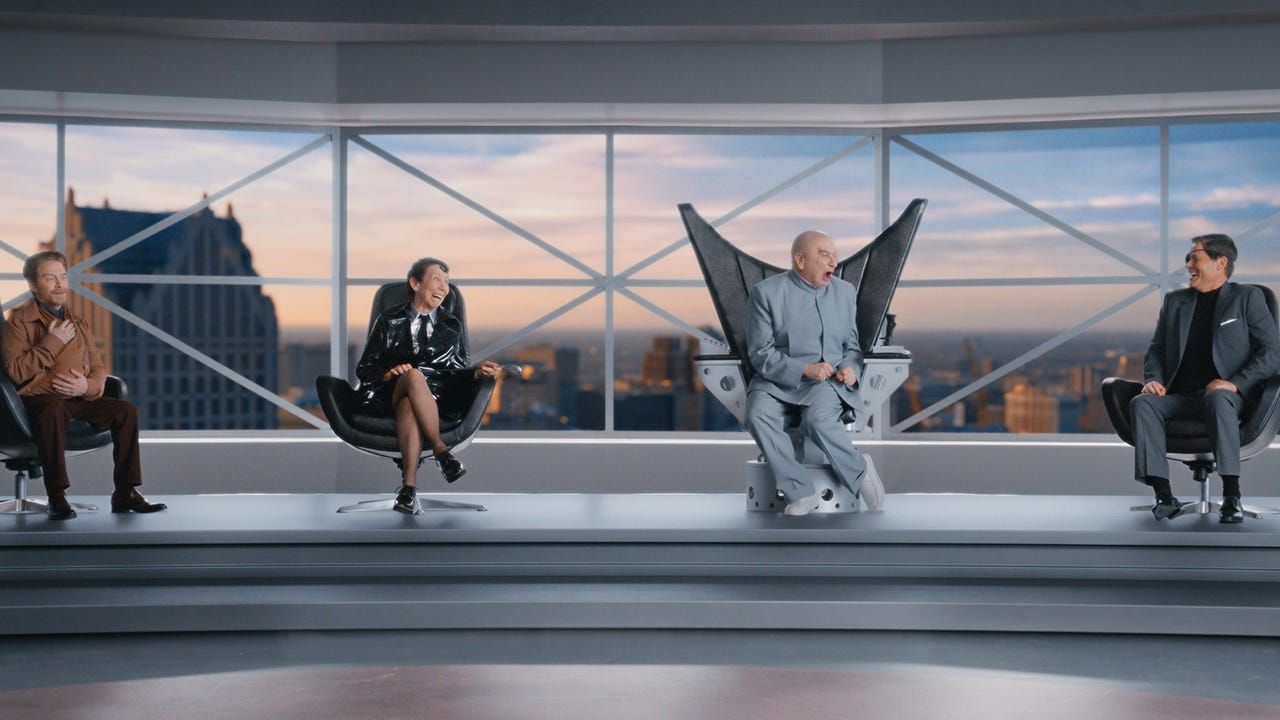
In a third electric car ad, we heard the theme tune of the Sopranos, and updated version of the shots of the New Jersey turnpike from the show’s credits, but instead of Tony, it was . . . Meadow Soprano, and she gets out of an electric car. It’s time for a “new generation,” apparently.
And because this is America, Chevy even got Actual David Chase to direct it.
Personally, I am surprised you would want your brand associated with a supervillain or a crime family—although I guess if your car is popular with mobsters, it’s a real testament to the size of the trunk. But it’s part of the ad industry’s attempt to rebrand of environmentalism as non-elite, non-judgemental and Well Macho. (See also: the replacement of “vegetarian” with “plant-based”.)
Utterly cynical? Yes. Probably a net benefit to the planet? Also yes.
Helen
PS. The best/worst Superbowl ad? There was some madness with Dolly Parton and Miley Cyrus singing “Do It For the Phone” (I think promoting 5G?) But Uber Eats had Cousin Greg, the flaky woman from White Lotus, Trevor Noah and finally Gwyneth Paltrow accidentally eating her vagina candle, to emphasise that Uber Eats now delivers things other than food. As someone put it: I’m old enough to remember when A-list celebrities only did commercials in Japan.
PPS. It was only 25 minutes in that I discovered the team wasn’t called the Cincinnati Bagels.
The Common Tongue of Twenty-First Century London (New Yorker)
The shifts in the language of London amount to more than the borrowing of vocabulary or changes in pronunciation: there are structural changes, too. David Hall, a linguist at Queen Mary University of London, has written of the organic emergence of a new pronoun, “man,” which, depending on its context, can mean “I” or “me” or “him” or “them.” As an example of generic-impersonal use, Hall gives the example “Man’s gotta work hard to do well these days.” To describe the second-person use, he cites a command that might be issued to an upset friend: “Man needs to calm down!” I asked Hall to meet me in a café in Mile End, in East London, not far from the university. Over coffee, Hall—who is young and bearded, and uses many features of M.L.E. in his speech—discussed other attributes of the linguistic variant, such as the dropping of prepositions with the verbs “go” and “come” in certain contexts.
“It has to be some sort of familiar or institutional goal, like ‘I went pub last night,’ or ‘I went chicken shop,’ ” he told me. “It can’t be ‘I went art gallery.’ ”
Rebecca Mead on “multicultural London English” and the pleasure of returning home to England after three decades in New York. I’m too old to use “bare” and “allow it”, but I love the range of emotion you can pack into MLE. It’s a great dialect for expressing surprise, or rather a kind of raised-eyebrow scepticism.
Adam Kay’s Deadly Misogyny (Unherd)
[Adam] Kay himself is in denial. In his memoir, when a baby dies, he ‘went for six months without laughing’. But he plays it for laughs. He became a comic when he left medicine, shortly after this baby died. ‘When cornered,’ he writes, ‘I would reach for my red nose and clown horn and bring put my anecdotes about objects in anuses and patients, “saying the funniest things”’. This passage comes at the end of the memoir, and it is a fragment of the book he should have written.
I haven’t been able to access iPlayer, so I haven’t yet watched This Is Going To Hurt and am basing all my opinions on the trailer, which I did find unpleasant: poor Adam Kay, wearing a woman like a glove puppet—hold on, how does the woman feel about all this? There was always a risk with adapting Kay’s memoir that the show would replicate the way that women have long been treated as objects in medicine—mere bleeding, suppurating, moaning curiosities to be dissected and apprehended and rationalised by the male gaze.
Kay is a smart, funny writer—I first encountered him with his band Amateur Transplants back in the 2000s, doing parody songs like I’ve Got One Hand (“I can’t tie my laces/I don't play the flute/My car is an automatic—”) and Coldplay’s Yellow (“You’re yellow, like the desert in Damascus is/You’re yellow cos your liver has metastases”). These were very funny and very dark; Kay has disavowed some of them for being too cruel. I think some of the reaction to This Is Going To Hurt is a reflection of a change in the culture from the early 2000s, where maybe we don’t want to hear about the black humour and dehumanisation that medics use to shield themselves from the trauma of the work they do.
I’m keeping an open mind and watching it this weekend—and in either case, this is what good drama does, which is make you feel something, and want to talk about it, to check your reactions against those of other people.
The Music Man Finally Marches In, Looking Backward (Vulture)
[Meredith] Willson’s looking backwards did peer into a few awkward corners of his Iowa upbringing, and where those memories have grown too offensive, cuts and elisions have been made. Scott Wittman and Marc Shaiman have delivered a kinder, gentler version of the charm song “Shipoopi,” which used to be about girls who put out. Shuler Hensley (strangely unnerved and overloud) now shouts “Shipoopi! Shipoopi! The boy who’s seen the light. Shipoopi! Shipoopi! To treat a woman right!” instead of the slightly more assault-y lyrics of the original. There has been progress, but that progress has happened in a song called “Shipoopi.”
The Music Man just opened on Broadway, with Hugh Jackman and Sutton Foster. It’s the musical that American children with big teeth and an outsize desire for attention get pushed into performing at school, a story about a huckster who attempts to con a town by putting together a band. The underlying message is that the town (and its initially reluctant librarian) want to be conned.
This Vulture review is great, and mentions something I wondered about: there are a couple of moments when Jackman seems to break character—when Foster shoves a library book at him, he reacts like it was much harder than he expected—but of course, it’s acting. The audience loved this; what felt like a little unguarded glimpse of the real person, a special moment with the Hollywood megastar hoofing it round the stage, just for us. We want to be conned, too.
Apart from that, my review after seeing The Music Man last weekend goes as follows: 1) LORD that was a lot of people to have on stage, no wonder they all got covid a few weeks ago; 2) I would love to see a version of this which took slightly more risks in the design and choreography; 3) my compliments to Hugh Jackman’s personal trainer. Man is 53!
As the passage quoted above mentions, the producers cut out anything which might be a little #problematic (the mayor’s classist reason for not wanting a rough kid to date his daughter, consent-disrespecting song lyrics) and they cast it colour-blind, so 1910s Iowa is now a place where race is no bar to advancement in civil society.
The latter decision allowed some brilliant minority actors to shine, although I am cautious about the cumulative effect of the theatre and TV industry retconning American history into a harmonious multicultural wonderland. (Not least because another stop on my American tour was the Museum of African-American history in DC, which was a powerful reminder of the reality of that history. The objects it holds—Klan hoods, slave shackles, and the hoodie Trayvon Martin was wearing when he was shot—are incredibly affecting.)
Talking of rewriting history, I also saw MJ: The Musical. Or rather, the first half. I’d only paid $59 for a ticket right at the back of the mezzanine—a pittance by Broadway prices—on the basis that, well, how much are you will to pay to be serenaded by a paedophile? And so I had no compunction walking out at halftime.
The musical is set during rehearsals for the Dangerous tour of 1992, interspersed with scenes from young Michael’s life. The first big shock was that this Michael Jackson was black. (Check the photos from that era, and the real MJ was paler than I am.) I spent a few amused moments ruminating on how it would have been received if the producers had cast a white guy—We all love colour blind casting? No? The actor also toned down Jackson’s whispery child-voice.
So why did I walk out? I couldn’t stomach it. There was a kid next to me the same age as some of the ones Jackson took for sleepovers at Neverland. Even if you buy the Jackson family’s line that nothing sexual happened, I don’t think we should look back warmly at an era where parents sent their kids to sleep in a castle with an adult man just because he was famous. (Honestly, tell me that families would have done that if Jackson was some random guy who lived down the road who owned a skeleton and loved to ride on funfairs.)
But this is an authorised musical, so all we got was some references to MJ being hopped on painkillers, and then a press conference where reporters asked some pointed questions and he launched into Earth Song. I started giggling at this point, and was tempted to explain to the kid next to me that the song for me will always be associated with the greatest pop culture moment of my childhood, when Jarvis Cocker ran on stage during its performance at the Brits and semi-mooned. (Fun fact: Bob Mortimer, who trained as a solicitor, provided his legal assistance that night.)
(Needless to say, the claim Cocker “assaulted three children” turned out to be untrue, and in retrospect, amazing chutzpah from the Jackson camp)
Back in the musical, some hack asked MJ about the “recent allegations” and the set splintered, with him launching into “They Don’t Really Care About Us.” Vom. There had already been a load of bumwash in the script about how MJ was doing the tour for world peace and his favourite charities. Yes, that is definitely why he needed to come out of the stage on a jet pack. World peace. Thinking about it now, it feels significant that MJ is framed around rehearsals for the Dangerous Tour, which launched in 1992, because the first police investigations began in August 1993, i.e. this is the last moment in Jackson’s life you could plausibly set a story without the child abuse allegations looming overhead.
I’m sure Jackson did feel that press questions were very mean and intrusive when he was just trying to heal the world, but honestly you can’t own a chimp and not expect people to raise some eyebrows.
Like I say, it was Earth Song that finished me off. I remembered how it felt to watch those BRIT Awards, seeing everyone ignore the elephant in the room as Jackson cast himself as the Messiah on a big lift emerging from dry ice, until one man went, “Hang on—”
The fact Jarvis Cocker protested by slapping his arse only makes me more proud to be British.
Anyway; there is an amazing musical to be written about Michael Jackson. The elements are all there: his father, the racist music industry, the messiah complex, his attempt to justify doing whatever he wanted because it was for charidee, the way his fame warped the minds of everyone around him . . . Plus, of course, his genius. The captivating, thrilling unselfconscious weirdness of the best of his music—HEE hee!—is inextricable from the weirdness of him as a person. But I doubt that the Jackson estate would allow that musical to be made.
Quick Links
“[James Baldwin] was fully aware that it was easier, and more profitable, both financially and in terms of his profile, to stride to the podium, as opposed to the desk. In a July 1965 televised BBC interview with the writer Colin MacInnes, Baldwin spoke openly of his predicament: ‘The great terror of public speaking is that you begin to listen to yourself. By and by, since you are always telling people what to think, you begin to forget what you do to think. And the moment that happens, of course, it’s over. It’s over’.” Beautiful piece on how James Baldwin becoming a public intellectual destroyed James Baldwin the artist. (Hat tip to Ian Leslie’s newsletter for this.)
“Let small bad things happen.” Great principles for better decision-making. (Medium)
“With a successful podcast, a comedian can circumvent the usual gatekeepers and build a cultishly loyal fanbase without even having to leave the house or — and this is crucial — worry about being funny. What do you call a comedian who doesn’t make people laugh? A podcaster. Ba dum tss.” Dorian Lynskey on the comedian’s licence. Contains a useful foray into Russell Brand’s full blown descent into the woo-asphere. (Unherd)
This longread about opening a restaurant is full of nerdy interest about supply chains and profit margins. It all sounds stressful and mad to me (Guardian).
“The nineties, for me—it was a real time for media. I worked for Vogue, writing the “People Are Talking About” column, and got paid five thousand dollars a month.” Thanks, Candace Bushnell. Now I’m crying. (New Yorker)
“My [sensitivity] Readers though, have not been hired as literary people. They are there to help create a book that would play better on Twitter, not one that is better written.” Kate Clanchy on submitting her controversial memoir to “sensitivity readers,” a relatively new phenomenon in publishing where a representative of a marginalized group offers feedback on your work. I have hesitations about this practice, which risks elevating one person as The Authority on What Gay People Think, although it is definitely true that anything written for a mass audience benefits from an editor who can alert you to any landmines you might be stepping on inadvertently. (You may still wish to tread on them, of course.)
Everything about this magazine cover is mesmerising. Why is Benedict Cumberbatch walking forward? Isn’t it bad to get soap on a swan?
Interesting polling from Scotland on reforms to gender recognition laws, which confirms my hunch that I’m actually more liberal on this than the median person, despite getting repeatedly no-platformed for my views. Basically, public opinion is fairly soft and unengaged, but people: don’t want unnecessary bureaucracy; are relaxed about toilets; are less relaxed about prisons (but I think would be open to the idea you treat a shoplifter differently to a rapist); are not at all relaxed about elite sport or child transition. Tony Blair is right that there is a compassionate, centre-left compromise position to be articulated if only Nicola Sturgeon and Keir Starmer were interested. (My sense is that the former likes the culture war, to burnish the SNP’s progressive credentials, and the latter is desperately hoping the whole issue will go away.)
Hmm, I see this turned into one of those themed newsletters… clearly, I’m uneasy about the modern impulse to airbrush art—but then, when you don’t, the result is something like This is Going To Hurt which then upsets people. So there is a huge reputational and commercial incentive to do it.
Maybe my conclusion is that artists should make art that tells the unvarnished truth, rather than presenting an idealised version of themselves and the world, and then critics should be free to point out the unpleasant parts of that truth, and that should be seen as a healthy and productive exchange.
In fifty years’ time we might look back at the cleaned-up versions of everything which are currently demanded by Twitter, and find them as odd as audiences today find the 18th century vogue for giving King Lear a happy ending.
See you next time!

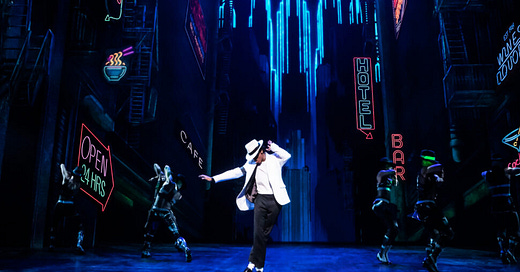

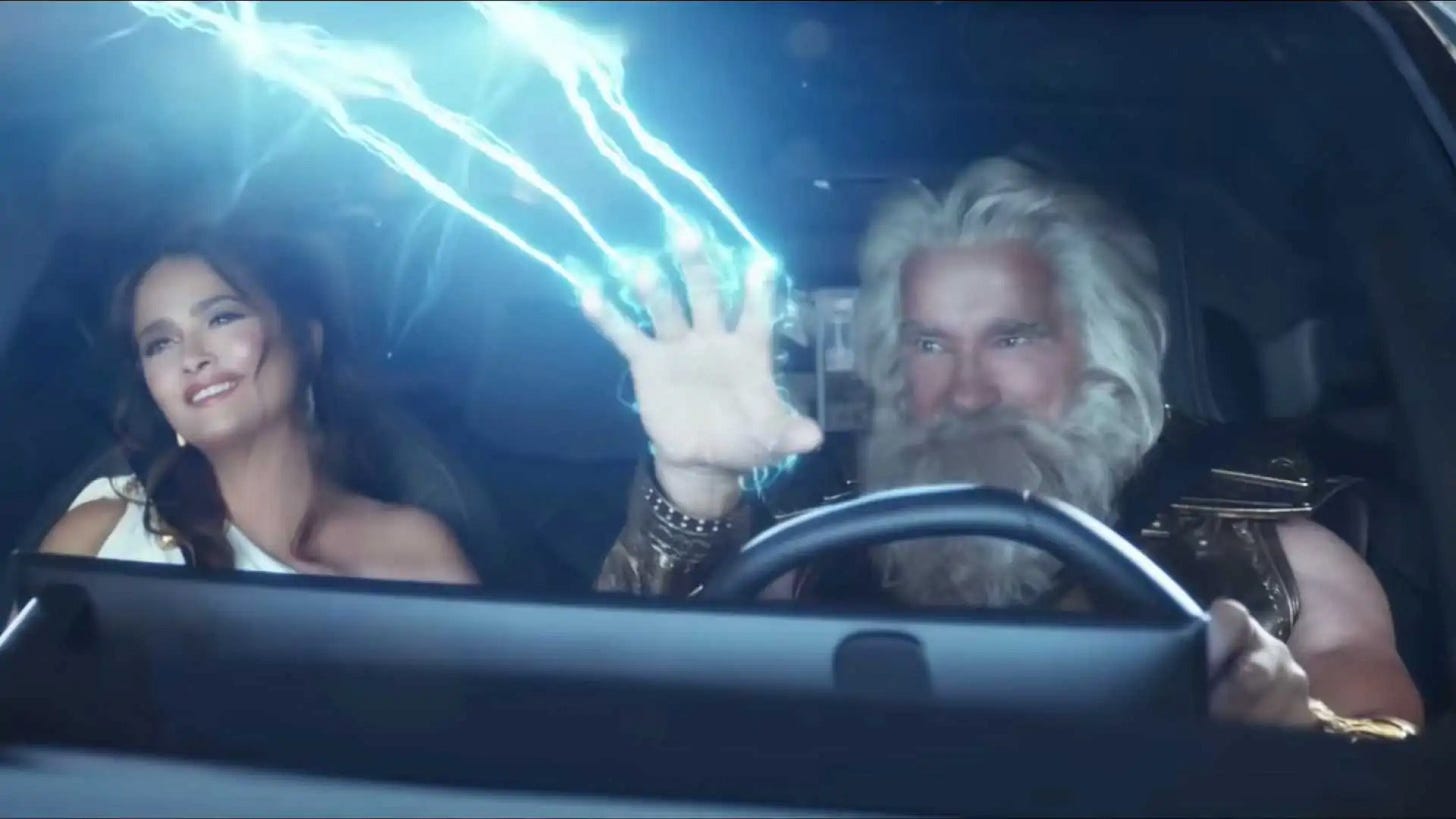


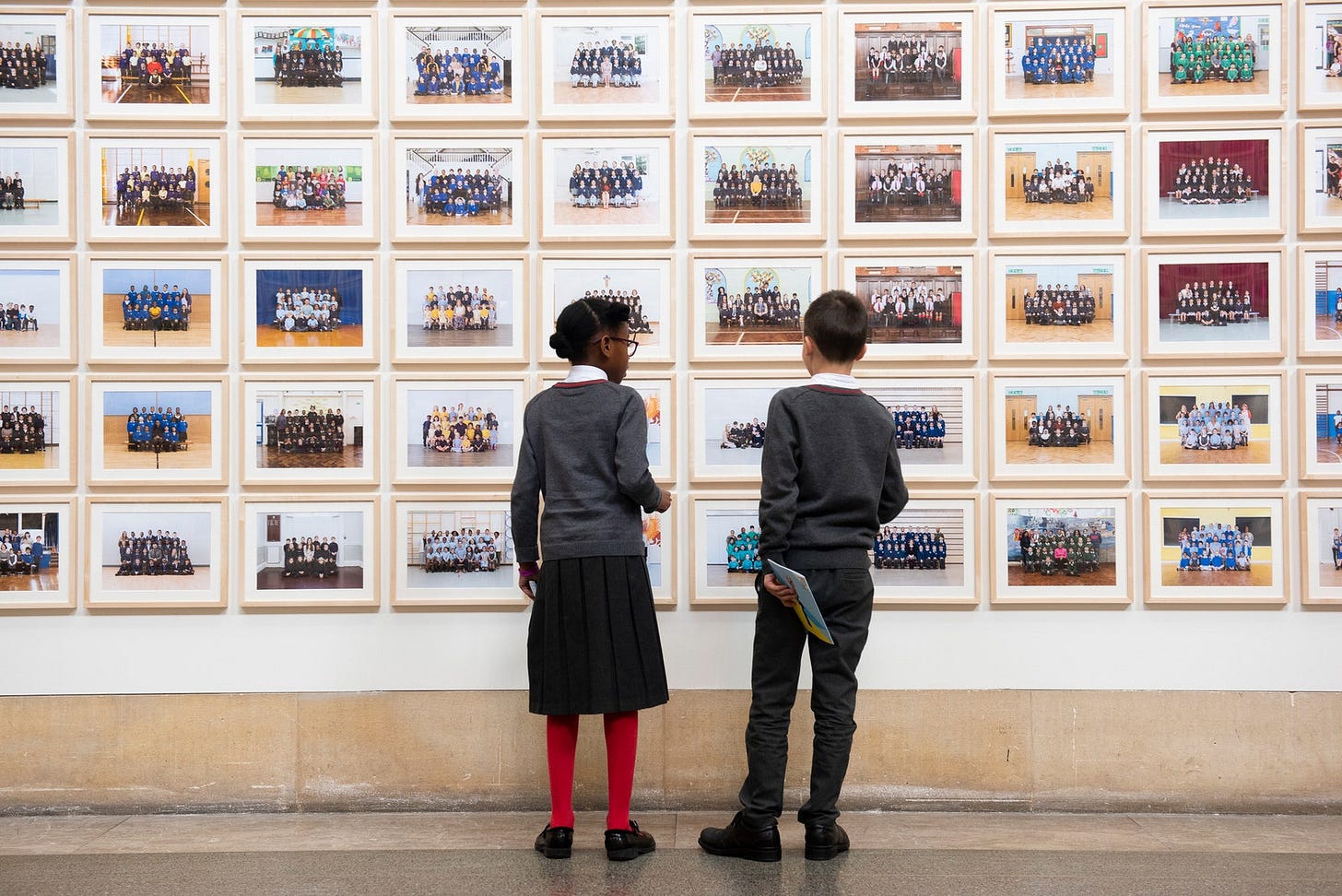

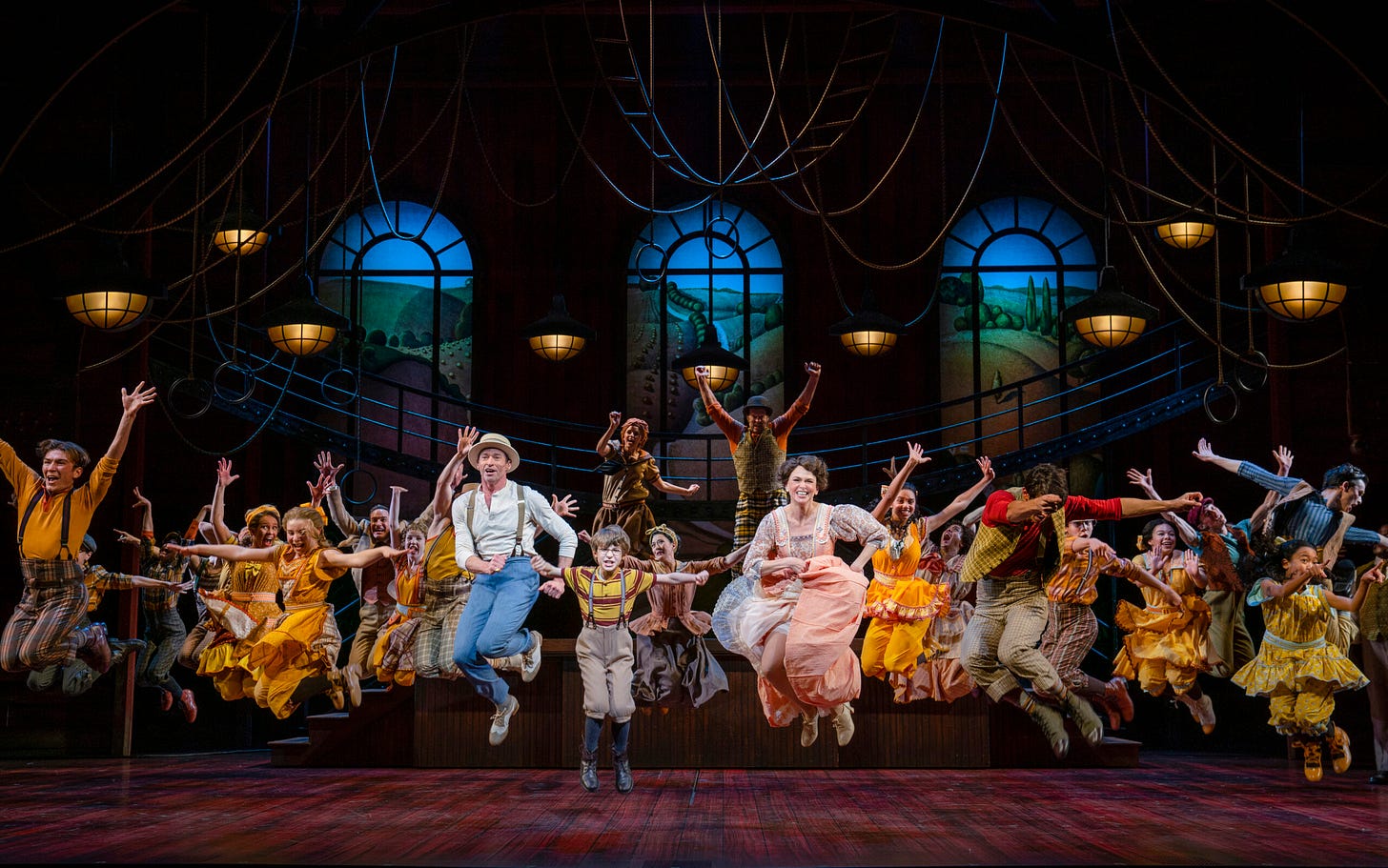

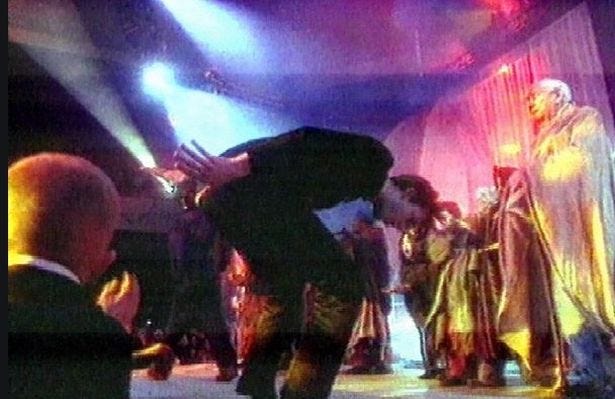
Thanks for including my decision-making article, Helen! I received quite a few sign-ups over the last few days, thanks to you! ☺️ 🙏